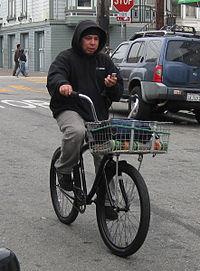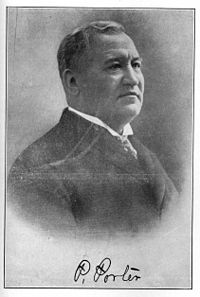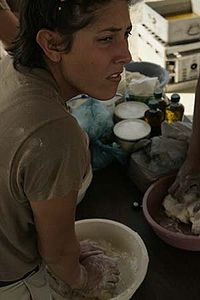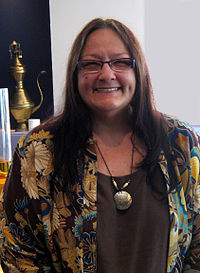- Muscogee (Creek) Nation
-
Muscogee (Creek) Nation Pleasant Porter, Principal Chief 1899-1907
Total population 69,162[1] Regions with significant populations  United States (
United States ( Oklahoma)
Oklahoma)Languages English, Muscogee language
Religion Christianity (Baptist, Methodist[2]),
Four Mother's SocietyRelated ethnic groups Alabama, Hitchiti, Koasati, Natchez Nation, Shawnee, Seminole, and Yuchi
The Muscogee (Creek) Nation is a federally recognized tribe of Muscogee people, also known as the Creek, based in the U.S. state of Oklahoma. They are regarded as one of the historical Five Civilized Tribes and call themselves Este Mvskokvlke.[2] The tribe is part of the Creek Confederacy, a large, heterogeneous group of Eastern Woodland tribes of the American Southeast.
The Muscogee (Creek) Nation is the largest of the federally recognized Muscogee tribes. The Muskogean-speaking Alabama, Hitchiti, and Natchez people, as well as Algonquian-speaking Shawnee[3] and Yuchi (language isolate) are enrolled in the Muscogee Creek Nation, although historically the latter two groups were from different language families than the Muscogee.
Other federally recognized Muscogee groups include the Alabama-Quassarte Tribal Town, Kialegee Tribal Town, and Thlopthlocco Tribal Town of Oklahoma; the Poarch Band of Creek Indians of Alabama, the Coushatta Tribe of Louisiana, and the Alabama-Coushatta Tribe of Texas.
Contents
Jurisdiction
The Muscogee (Creek) Nation is headquartered in Okmulgee, Oklahoma. Oklahoma Indian tribes do not have reservations (with one exception); they have Tribal Jurisdictional Areas. The Muscogee Nation has jurisdiction in Creek, Hughes, Okfuskee, Okmulgee, McIntosh, Muskogee, Tulsa, and Wagoner counties in Oklahoma.[1]
Government
The government of the Muscogee Creek Nation is divided into executive, legislative, and judicial branches.[4]
Executive branch
The executive branch is led by a Principal Chief, Second Chief, Chief of Staff, Executive Director, and Secretary of the Nation. The Principal Chief and Second Chief are democratically elected every four years. The Principal Chief then chooses staff. The current members of the executive branch are as follows:
- A. D. Ellis, Principal Chief
- Alfred Berryhill, Second Chief
- Edwin Marshall, Chief of Staff
- Claude Sumner, Executive Direction
- Kevin Dellinger, Secretary of the Nation.[5]
Legislative branch
The legislative branch is the National Council, made up of 26 members elected to represent different districts within the tribal jurisdictional area. They write the laws of the Nation.[4]
Judicial branch
The Nation has two courts: the Muscogee (Creek) Nation District Court and the Supreme Court. The Supreme Court has final authority over disputes about the Muscogee Creek Constitution and Laws.[4]
Services
The Nation operates its own division of housing and issues vehicle license plates.[1] Their Division of Health contracts with Indian Health Services to maintain the Creek Nation Community Hospital and several community clinics, a vocational rehabilitation program, nutrition programs for children and the elderly, and programs dedicated to diabetes, tobacco prevention, and caregivers.[6]
The Muscogee Nation is policed by the Lighthorse Tribal Police Department, with 43 active employees.[7] The tribe has its own program for enforcing child support payments.
The Mvskoke Food Sovereignty Initiative, sponsored by the Nation, educates and encourages tribal members to grow their own traditional foods for health, environmental sustainability, economic development, and sharing of knowledge and community between generations.[8]
The Muscogee Nation also operates a Communications Department that produces a bi-monthly news paper, the Muscogee Nation News and a weekly Television show the Native News Today.
Economic development
 Muscogee Creek-Navajo bike messenger, originally from Okmulgee, Oklahoma, 2009.
Muscogee Creek-Navajo bike messenger, originally from Okmulgee, Oklahoma, 2009.
Creek Nation Tribal Trade and Commerce and Creek Nation Business Enterprise oversee economic development projects for the tribe.[1] The tribal government operates a budget in excess of $106 million; has over 2,400 employees; and maintains tribal facilities and programs in eight administrative districts.[5] The nation operates several significant tribal enterprises, including the Muscogee Document Imaging Company; travel plazas in Okmulgee, Muskogee and Cromwell, Oklahoma; construction, technology and staffing services; and major casinos in Tulsa and Okmulgee.
The Creek Nation operates two truck stops, 30 tribal smokeshops, two bingo halls, and eleven casinos.[1] Gaming establishments owned by the tribe include Bristow Indian Bingo in Bristow; Checotah Indian Community Bingo in Checotah; Creek Nation Casino Duck Creek in Beggs; Creek Nation Casino Muskogee; Creek Nation Casino Okemah; Creek Nation Casino Okmulgee; Creek Nation Travel Plaza in Okmulgee, Eufaula Indian Community Bingo in Eufaula; Duck Creek Casino in Beggs; and River Spirit Casino in Tulsa.[9]
Civic institutions
Further information: Creek National CapitolThe Nation's historic old Council House (also known as the Creek National Capitol) was built in 1878 and located in downtown Okmulgee. It was completely restored in the 1990s. It now serves as a museum of tribal history. The Red Stick Gallery in the museum features contemporary art by tribal members.[10][11]
Tribal college
In 2004, the Muscogee Nation founded a tribal college, College of the Muscogee Nation, in Okmulgee. CMN is a two-year institution, offering associate degrees in Tribal Services, Police Science, Gaming, and Native American Studies. They offer Mvskoke language classes as well. In 2007, 137 students enrolled and the college has plans for expansion.[12]
History
The Nation is descended from the Creek and their slaves who were forced by the US government to relocate from their ancestral homes in the Southeast to Indian Territory in the 1830s.
During the American Civil War, the tribe allied with the Confederacy. There were conflicts between pro-Confederate and pro-Union forces in the Indian Territory during the war. With the United States victory, it required the negotiation of new treaties with the Five Civilized Tribes. The Treaty of 1866 required the Creek to abolish slavery within their territory and to grant citizenship to the Creek Freedmen who chose to stay in the territory, including voting rights and shares of annuities and land allotments. If the Creek Freedmen moved out, they would be granted United States citizenship.
The Creek established a new government in 1866 and selected a new capital of Okmulgee. In 1867 they ratified a new constitution.[2] They built their capitol in 1867 and enlarged it in 1878. Today the Creek National Capitol is a National Historic Landmark and houses the Creek Council House Museum. The Nation built schools, churches, and public houses during the prosperous final decades of the 19th century, when the tribe had autonomy and minimal interference from the federal government.[2]
The turn of the century brought the 1898 Curtis Act, which dismantled tribal governments; and the Dawes Allotment Act, which broke up tribal landholdings to allot land to individual households to encourage assimilation as subsistence farmers in the US style. The Dawes Commission registered tribal members in two categories, distinguishing between "Creek by Blood" and "Creek Freedmen," into which category they put anyone with recognizable African ancestry, regardless of their proportion of Creek ancestry. The 1905 Five Civilized Tribes Act was passed by the US Congress in anticipation of approving statehood for Oklahoma in 1907. During this time, Creeks lost over 2 million acres (8,100 km2) to non-Native settlers and the US government. Later, under the 1936 Oklahoma Indian Welfare Act, some Muscogee tribal towns gained federal recognition.
The Muscogee (Creek) Nation did not reorganize and regain federal recognition until 1970. In 1979 the tribe ratified a new constitution that replaced the 1866 constitution.[2] The pivotal 1976 court case Harjo v. Kleppe helped end US federal paternalism. It ushered in an era of growing self-determination. Using the Dawes Rolls as a basis for determining membership of descendants, the Nation enrolled over 58,000 allottees and their descendants.
Creek Freedmen controversy
From 1981-2001, the Creek had membership rules that allowed applicants to use a variety of documentary sources to establish qualifications for membership.
In August 2001, the Creek passed new membership rules, requiring citizens to be descended from an ancestor on the "Creek by blood" registers of the Dawes Rolls. They excluded descendants of "Creek Freedmen," although they were listed on the Dawes Rolls and often documented in other registers as having ancestors with Creek blood. The Freedmen had been listed on a separate register, regardless of their proportion of Creek ancestry, and there had been intermarriage between the ethnic groups for years. Prior to the change in code, Creek Freedmen could use existing registers and the preponderance of evidence to establish qualification for citizenship, and were to be aided by the Citizenship Board. The Creek Freedmen have challenged their exclusion from citizenship in legal actions which are pending.
Notable Muscogee Nation people
- Fred Beaver (1911-1980), artist
- Acee Blue Eagle (1909-1959), actor, artist, author, and educator
- Ernest Childers (1918-2005), Lt. Col. in the US Army, first Native American WWII Medal of Honor recipient
- Chitto Harjo (1846-1911), leader of the Crazy Snake Rebellion
- Eddie Chuculate (b. 1972), journalist and fiction writer
- Joy Harjo (b. 1959), poet and musician
- Joan Hill (b. 1930), painter
- Jack Jacobs (1919-1974), football player
- William Harjo LoneFight (b. 1966), author, President of Native American Services, languages and cultural activist
- Opothleyahola (1798 - 1863), Muscogee chief, warrior leader during first two Seminole Wars and the Civil War.
- Alexander Posey (1873—1908), Muscogee Creek poet, humorist, journalist, and politician
- Pleasant Porter (1840-1907), Principal Chief from 1899-1907
- Will Sampson (1933-1987), film actor, noted for his performance in One Flew Over the Cuckoo's Nest
- Johnny Tiger, Jr. (b. 1940), artist
- France Winddance Twine, sociologist
- Carrie Underwood (b. 1983), country singer[13][14]
See also
- Muscogee (Creek)
- Muscogee language
- Muscogee mythology
- Ocmulgee National Monument
- Stomp dance
Notes
- ^ a b c d e "Pocket Pictorial." Oklahoma Indian Affairs Commission. 2010: 23. (retrieved 10 June 2010)
- ^ a b c d e Isham, Theodore and Blue Clark. Creek (Mvskoke). Oklahoma Historical Society's Encyclopedia of Oklahoma History and Culture. (retrieved 22 Dec 2009)
- ^ Innes, 393
- ^ a b c "MCN Governmental Branches." Muscogee (Creek) Nation. 2008 (retrieved 22 Dec 2009)
- ^ a b "Office of the Administration." Muscogee (Creek) Nation. 2008 (retrieved 27 July 2011)
- ^ "Division of Health." Muscogee (Creek) Nation. (retrieved 28 Dec 2009)
- ^ "Lighthorse Tribal Police." Muscogee (Creek) Nation. (retrieved 28 Dec 2009)
- ^ "About MFSI." Mvskoke Food Sovereignty Initiative. (retrieved 28 Dec 2009)
- ^ "Oklahoma Indian Casinos." 500 Nations. (retrieved 22 Dec 2009)
- ^ "Creek Council House Museum." Attractions in Okmulgee, Oklahoma. (retrieved 22 Dec 2009)
- ^ Clifton Adcock, "Creeks ask to buy Council House: The U.S. sold it out from under them to the city of Okmulgee in 1919. It's now a museum.", Tulsa World, March 18, 2010.
- ^ College of the Muscogee Nation Frequently Asked Questions. (retrieved 22 Dec 2009)
- ^ La Bella, Laura. Carrie Underwood. New York: Rosen Publishing, 2008: 15. ISBN 978-1404213708. (retrieved through Google Books, 5.April.2009)
- ^ Creek Nation Tribal Member Carrie Underwood Wins Grammy. Free Press. 14.Feb.2007 (retrieved 5.April.2009)
References
- Innes, Pamela. "Creek in the West." William C. Sturtevant, editor. Handbook of North American Indians: Volume 14, Southeast. Washington DC: Smithsonian Institution, 2004. ISBN 0-16-072300-0.
External links
- Muscogee (Creek) Nation, official website
- Mvskoke Etlvlwv Nakcokv Mvhakv Svhvlwecvt (College of the Muscogee Nation)
- Muscogee Nation District Court
- Muscogee (Creek) Nation Bar Association
- Creek (Mvskoke), Oklahoma History Society article
- Womack, Craig. "Aestheticizing a Political Debate: Can the Creek Confederacy Be Sung Back Together?" Southern Spaces, November 20, 2007, http://southernspaces.org/2007/aestheticizing-political-debate-can-creek-confederacy-be-sung-back-together.
- Womack, Craig. "Baptists and Witches: Multiple Jurisdictions in a Muskogee Creek Story." Southern Spaces, July 17, 2007, http://southernspaces.org/2007/baptists-and-witches-multiple-jurisdictions-muskogee-creek-story.
Native American tribes in Oklahoma Federally
recognized
tribesAbsentee-Shawnee Tribe of Indians of Oklahoma · Alabama-Quassarte Tribal Town · Apache Tribe of Oklahoma · Caddo Nation of Oklahoma · Cherokee Nation · Cheyenne and Arapaho Tribes · Chickasaw Nation · Choctaw Nation of Oklahoma · Citizen Potawatomi Nation · Comanche Nation · Delaware Nation · Delaware Tribe of Indians · Eastern Shawnee Tribe of Oklahoma · Fort Sill Apache Tribe of Oklahoma · Iowa Tribe of Oklahoma · Kaw Nation · Kialegee Tribal Town · Kickapoo Tribe of Oklahoma · Kiowa Indian Tribe of Oklahoma · Miami Tribe of Oklahoma · Modoc Tribe of Oklahoma · Muscogee Creek Nation · Osage Tribe · Otoe-Missouria Tribe of Indians · Ottawa Tribe of Oklahoma · Pawnee Nation of Oklahoma · Peoria Tribe of Indians of Oklahoma · Ponca Tribe of Indians of Oklahoma · Quapaw Tribe of Indians · Sac and Fox Nation · Seminole Nation of Oklahoma · Seneca-Cayuga Tribe of Oklahoma · Shawnee Tribe · Thlopthlocco Tribal Town · Tonkawa Tribe of Indians of Oklahoma · United Keetoowah Band of Cherokee Indians in Oklahoma · Wichita and Affiliated Tribes · Wyandotte NationTribal languages
(still spoken)Alabama · Arapaho · Caddo · Cayuga · Cherokee · Cheyenne · Chickasaw · Chiwere (Iowa and Otoe) · Choctaw · Comanche · Delaware · Koasati · Hitchiti-Mikasuki · Mescalero-Chiricahua · Mesquakie (Fox, Kickapoo, and Sauk) · Muscogee · Osage · Ottawa · Pawnee · Ponca · Potawatomi · Quapaw · Seneca · Shawnee · Wichita · Wyandot · YuchiCategories:- Muscogee
- Native American tribes in Oklahoma
- Federally recognized tribes in the United States
Wikimedia Foundation. 2010.



